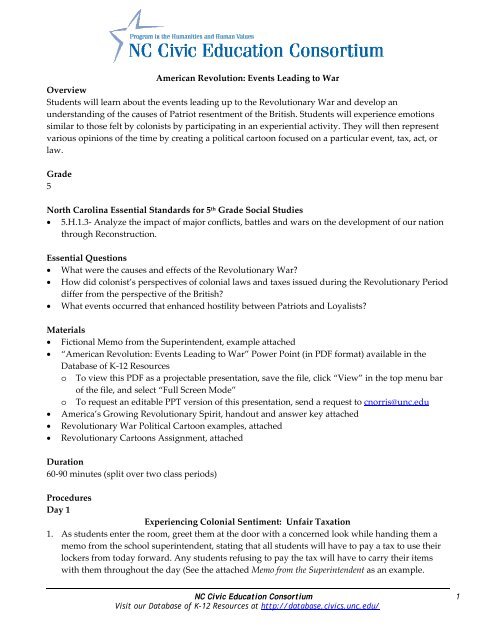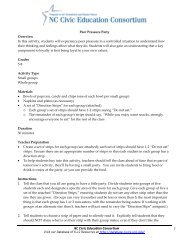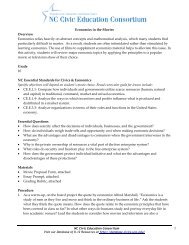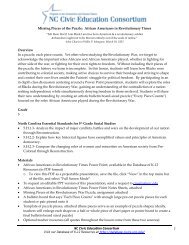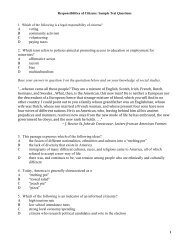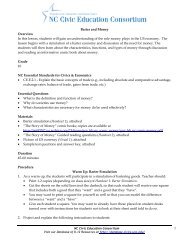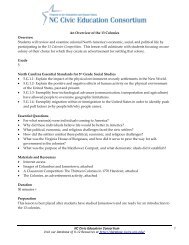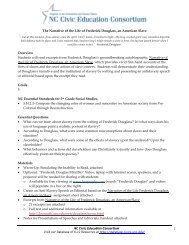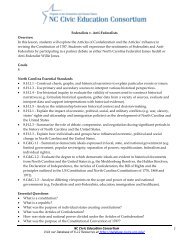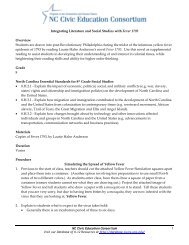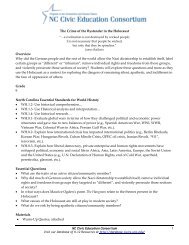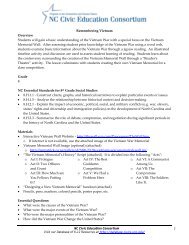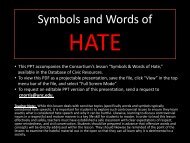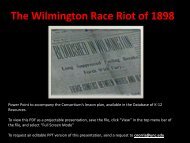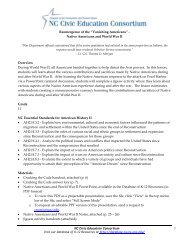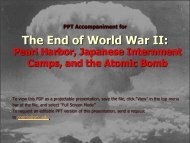American Revolution - Database of K-12 Resources
American Revolution - Database of K-12 Resources
American Revolution - Database of K-12 Resources
Create successful ePaper yourself
Turn your PDF publications into a flip-book with our unique Google optimized e-Paper software.
Name: ________________________________________<strong>Revolution</strong>ary Cartoons AssignmentDue date: ___________________________________Assignment:Create a political cartoon focused on an event, tax, act, or law that contributed tothe outbreak <strong>of</strong> the <strong>Revolution</strong>ary War.ExpectationsMeets requirements <strong>of</strong> a political cartoon: contains opinion,commentary, satire, etc.Content:focuses on contributing factor <strong>of</strong> Rev. WarAccuracy:shows a clear and correct understand <strong>of</strong> contributing factor representedGraphics:clarity, originality, and relevance to the assignmentCreativity:color, original idea evident, overall attractiveness, etc.PointsPossiblePointsAwarded----------------------------------------------------------------------------------------------------------------------------Name: ________________________________________<strong>Revolution</strong>ary Cartoons AssignmentDue date: ___________________________________Assignment:Create a political cartoon focused on an event, tax, act, or law that contributed tothe outbreak <strong>of</strong> the <strong>Revolution</strong>ary War.ExpectationsMeets requirements <strong>of</strong> a political cartoon: contains opinion,commentary, satire, etc.Content:focuses on contributing factor <strong>of</strong> Rev. WarAccuracy:shows a clear and correct understand <strong>of</strong> contributing factor representedGraphics:clarity, originality, and relevance to the assignmentCreativity:color, original idea evident, overall attractiveness, etc.PointsPossiblePointsAwardedNC Civic Education Consortium 7Visit our <strong>Database</strong> <strong>of</strong> K-<strong>12</strong> <strong>Resources</strong> at http://database.civics.unc.edu/
Name: __________________________________America’s Growing <strong>Revolution</strong>ary SpiritUsing your prior knowledge, your book, the internet, or any other resource in this room, research the following acts, events, and issues that contributed tothe <strong>Revolution</strong>ary spirit <strong>of</strong> America. For each term:1. Define what it is.2. Infer how Patriots and Loyalists may have felt about the act, event, issue, etc.3. Sketch a small picture or symbol that represents the term and will help you remember its meaning.Tax or Event Definition How would Patriots have felt about this event? Picture or SymbolHow would Loyalists have felt about this event?Writs <strong>of</strong> assistanceAlbany Plan <strong>of</strong> Union,1754Proclamation <strong>of</strong> 1763Sugar Act, 1764Quartering Act, 1765
Tax or Event Definition How would Patriots have felt about this event? Picture or SymbolHow would Loyalists have felt about this event?Stamp Act, 1765Stamp Act Congress,1765Declaratory Act <strong>of</strong> 1766Sons <strong>of</strong> LibertyNon-ImportationAssociation(1768)/boycotts
Tax or Event Definition How would Patriots have felt about this event? Picture or SymbolHow would Loyalists have felt about this event?Boston Massacre, 1770Boston Tea Party, 1773Intolerable Acts, 1774Battles <strong>of</strong> Lexington andConcord, 1775 (“the shotheard round the world”)The Declaration <strong>of</strong>Independence, 1776
America’s <strong>Revolution</strong>ary Spirit- ANSWER KEY*Answers will vary for Columns 2 and pictures/symbols will vary for Column 3Tax or Event DefinitionWrits <strong>of</strong> assistance A legal document that serves as a general search warrant to British <strong>of</strong>ficers. This document enabled <strong>of</strong>ficials to inspect not onlyshops and warehouses, but also private homes.Albany Plan <strong>of</strong> Union, A plan to place the British North <strong>American</strong> colonies under a more centralized government. The plan was adopted on July 10, 1754,1754by representatives from seven <strong>of</strong> the British North <strong>American</strong> colonies. Although never carried out, it was the first important plan toconceive <strong>of</strong> the colonies as a collective whole united under one government.Proclamation <strong>of</strong> 1763 This Proclamation was issued by King George III to organize Britain's new North <strong>American</strong> empire and to stabilize relations withNative North <strong>American</strong>s through regulation <strong>of</strong> trade, settlement, and land purchases on the western frontier. The Proclamation <strong>of</strong>1763 forbade English colonists to live west <strong>of</strong> the Appalachian Mountains.Sugar Act, 1764 The Sugar Act set a tax on sugar and expanded the list <strong>of</strong> taxable items to include specified wines and cloth, c<strong>of</strong>fee, tropical foodsand silk.Quartering Act, 1765 This act required the colonies to provide the basic needs <strong>of</strong> British soldiers- specified items included housing, cooking utensils,firewood and candles.Stamp Act, 1765 The Stamp Act <strong>of</strong> 1765 was a tax imposed by the British Parliament on the colonies that required them to pay a tax on every piece<strong>of</strong> printed paper they used (legal documents, licenses, ship’s papers, newspapers, etc.). The money collected by the Stamp Act wasStamp Act Congress,1765to be used to help pay the costs <strong>of</strong> defending and protecting the <strong>American</strong> frontier.The Stamp Act Congress convened in New York City on October 7 with nine colonies in attendance to discuss and act upon theStamp Act. The delegates approved a 14-point Declaration <strong>of</strong> Rights and Grievances. The statement said that colonial taxation couldonly be carried out by their own assemblies, not Great Britain.Declaratory Act <strong>of</strong> 1766 This act <strong>of</strong> the Parliament <strong>of</strong> Great Britain was one in a series <strong>of</strong> resolutions passed attempting to regulate the behavior <strong>of</strong> thecolonies. It stated that Parliament had the right to make laws for the colonies in all matters –including taxation.Sons <strong>of</strong> Liberty A secret organization <strong>of</strong> <strong>American</strong> colonists formed initially to protest the Stamp Act. Members <strong>of</strong> the group, including merchants,Non-ImportationAssociation(1768)/boycottsbusinessmen, lawyers, journalists, and others, took on the motto "no taxation without representation."The Non-Importation Agreements were a series <strong>of</strong> commercial restrictions adopted by <strong>American</strong> colonists to protest British taxation.Merchants in New York, Boston and Philadelphia agreed collectively to boycott British imports until Parliament repealed the StampAct.Boston Massacre, 1770 During the Boston Massacre, five civilian colonists were killed by British soldiers. It was the culmination <strong>of</strong> civilian-military tensionsthat had been growing since royal troops first appeared in Massachusetts in October 1768 to enforce the heavy tax burden.Boston Tea Party, 1773 The Boston Tea Party was a direct action protest by colonists in Boston against the British government. On December 16, 1773, after<strong>of</strong>ficials in Boston refused to return three shiploads <strong>of</strong> taxed tea to Britain, a group <strong>of</strong> colonists boarded the ships and destroyed thetea by throwing it into Boston Harbor.
Intolerable Acts, 1774 “Intolerable Acts” was a popular name given by <strong>American</strong>s to four laws passed by the British Parliament in 1774 in response to theBoston Tea Party. The Intolerable Acts, also called Coercive Acts, were intended to punish the colony <strong>of</strong> Massachusetts fordestroying tea that belonged to the East India Company and to show the other <strong>American</strong> colonies what might happen if theyBattles <strong>of</strong> Lexington andConcord, 1775 (“the shotheard round the world”)disobeyed British policies.The Battles <strong>of</strong> Lexington and Concord were the first military engagements <strong>of</strong> the <strong>American</strong> <strong>Revolution</strong>ary War. They were fought onApril 19, 1775, in Middlesex County, Massachusetts. The battles marked the outbreak <strong>of</strong> open armed conflict between Great Britainand the colonies.The Declaration <strong>of</strong>Independence, 1776A statement, written primarily by Thomas Jefferson, that was adopted by the Continental Congress on July 4, 1776, whichannounced that the thirteen <strong>American</strong> colonies then at war with Great Britain were now independent states, and thus no longer apart <strong>of</strong> the British Empire


